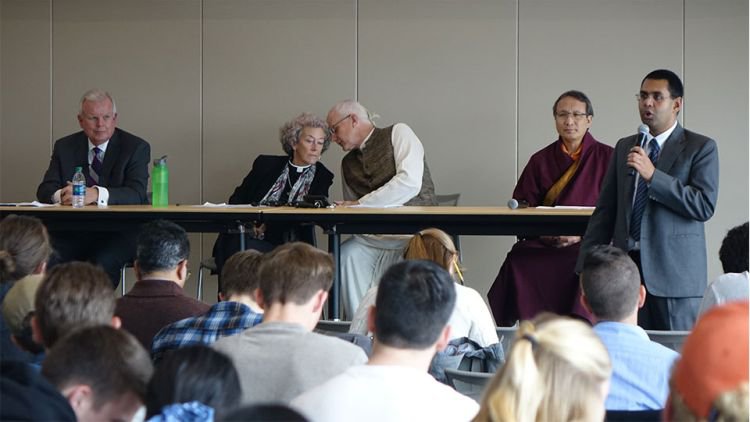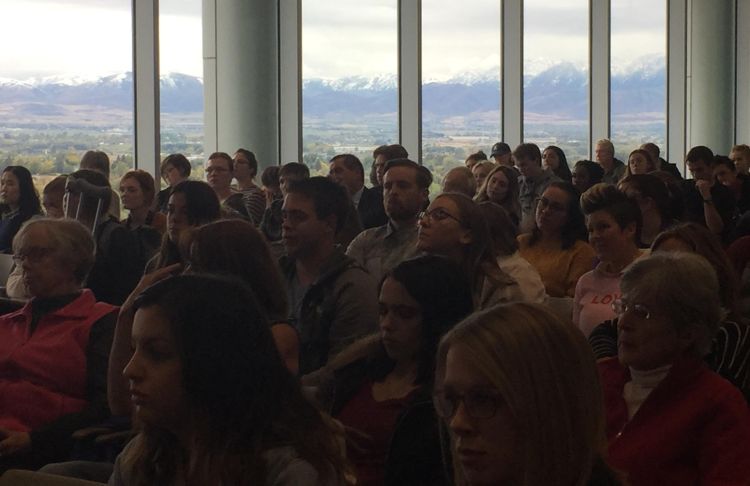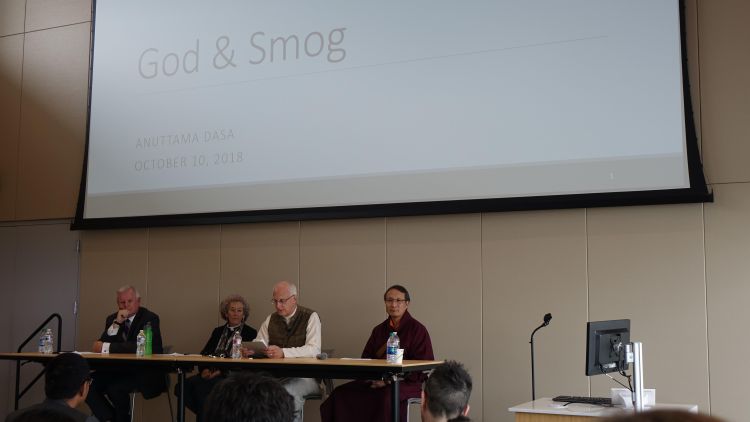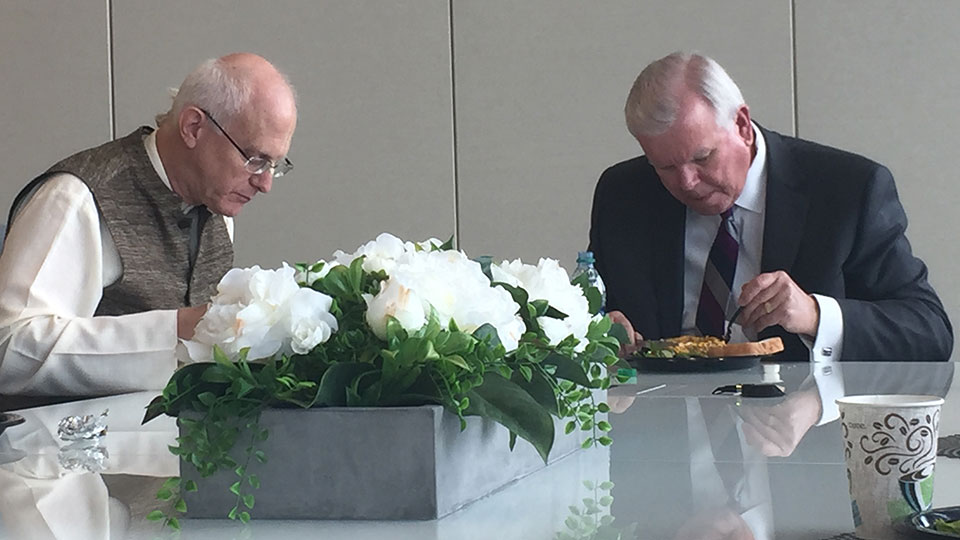
By Madhava Smullen
About 150 students, professors and other interested persons attended a one-day open conference at Utah State University on October 18th entitled “God and Smog – The Challenge of Preserving our Planet.”
Subtitled “Scholars and Religious Leaders Confront the Issues,” the event was organized by USU’s Religious Studies Program, headed by Director Dr. Ravi Gupta (Radhika Ramana Das).
Darren B. Parry, tribal council chairman for the Northwest Band of the Shoshone Nation, led the convocation, followed by a welcome from the Mayor of Logan City, Utah, and an introduction by Radhika Ramana.
A panel of four scholars, including a scholar of the Church of Jesus Christ of Latter Day Saints; a scholar of Buddhism; a scholar of Hinduism; and a scholar of Protestant Christianity then spoke, providing arguments from each tradition in support of caring for the environment.
On the topic of concern for the future of our earthly home, the Protestant scholar quoted from Proverbs 29:18: “Where there is no vision, the people perish.” She emphasized the need for us to live not just for today, but to consider the impact of our actions.
The scholar of Hinduism said that contemplating the essential Hindu principle of connectedness of all beings could inspire us to awaken environmental consciousness.
Meanwhile the LDS scholar pointed out that valuing four things would help motivate us in caring for the Earth. The first was the sanctity of human life, including caring for the poor – here he addressed the effect climate change is having on impoverished communities around the world.
The second was the sanctity of biological life, and how being humancentric does not mean a lack of care for other species.The third was the sanctity of future generations. The LDS scholar reminded us that the fate of the earth and our descendents depend upon how we care for the earth now. And the fourth was the sanctity of freedom – we must see the cost and impact of our choices on the Earth and others, the scholar said, and not abuse our freedom.

In the afternoon, a separate panel of religious leaders spoke, including a senior leader of the Church of Jesus Christ of Latter Day Saints; a Reverend from the Episcopal Church; a monk from the Tibetan Buddhist tradition; and ISKCON Communications Director Anuttama Das, representing Vaishnava Hinduism.
Each leader was asked to answer the questions: why is environmental stewardship an imperative in your tradition? And what theological resources does your tradition offer to support care for the earth?
During his twenty-minute presentation, Anuttama Das opined that as a Vaishnava, one is hard-pressed not to be an environmentalist. He gave six primary reasons for this, presenting each reason as its own section with its own title.
In “God is a Playful Environmentalist,” he read from the Srimad-Bhagavatam about how Krishna Himself intervened to drive Kaliya out of the Yamuna river, because the serpent’s presence had poisoned the river and was devastating the water, land, animals and birds. Anuttama also mentioned Lord Varaha, who rescued the Earth.

In “God Owns Everything,” he quoted from the Sri Isopanisad, explaining that when we understand that God is the owner of all, we automatically take less for ourselves, and care for it better.
In his third section, Anuttama said that because “All Life is Sacred,” we should care for all of the earth’s creatures; and that to be serious about environmentalism, we should adopt a vegetarian lifestyle.
In “We’re Just Passing Through, So Act Responsibly,” Anuttama quoted from the Vedanta Sutra: “Now, therefore, having acquired the human form of life, it’s time to enquire into the Absolute Truth.” Because we are here temporarily and the purpose of life is not to enjoy sensual gratification, he said, we should tread softly on the earth.
Next, “Simple Living, High Thinking,” looked at how the Bhakti Yoga tradition teaches that we should live more simply and not consume things we don’t need. Anuttama cited ISKCON’s eco communities at Govardhana Eco Village in Mumbai, Nova Gokula farm in Brazil, and New Vrajadhama in Hungary as practical examples.
“The Law of Karma” was Anuttama’s final reason for Vaishnavas to be environmentalists. If we harm the earth or its creatures, he said, we’ll suffer reactions. Already, our exploitation of the earth is causing us to suffer from pollution, climate change, scarcity of water, rising sea levels, flooding, fires and more.

Like the other religious leaders, Anuttama also discussed some of the challenges in inspiring Vaishnavas to make environmental care a priority.
“I mentioned that because we understand the world is Maya, or illusion, sometimes we may think that we don’t need to care for it,” he says. “I also mentioned arrogance – we may think we’re especially blessed, and therefore not so accountable for our actions.”
Anuttama explained that in order to care for the planet we must first clean our own hearts, and concluded, “I will now end by reciting a prayer or mantra from my tradition, asking God to cleanse our hearts and minds, and make us all instruments of His peace.” He then chanted a full Hare Krishna maha-mantra.
“Utah State University students who attended really loved Anuttama Prabhu’s presentation,” says Religious Studies Program Director Radhika Ramana Das. “In particular, they appreciated the story of Kaliya. Krishna dealing with an ecological problem in His own time gives us a powerful message for our time – that Kaliya is back, but perhaps in a different form.”
“All over the world,” Radhika Ramana continues, “Wonderful sacred rivers are being polluted, including the river Yamuna once again. And Krishna’s story serves as a call for all of us to be inspired by our religious belief, and to act for ecological change and preservation.”
Overall, Radhika Ramana feels that the God and Smog conference was significant because it brought together religious leaders with considerable influence amongst their congregations, scholars who have done lifelong study of the religious perspective on ecological issues, and students who will be the scholars and leaders of the next generation.
“There are few things as influential in our world and in people’s lives as religion,” Radhika Ramana says. “And there are few issues that are as pressing for us as human beings, as the condition of our environment. So it seemed like a natural thing to bring these two together. And we certainly hope that this conference will serve as a kind of springboard for more action in the future.”
Comments